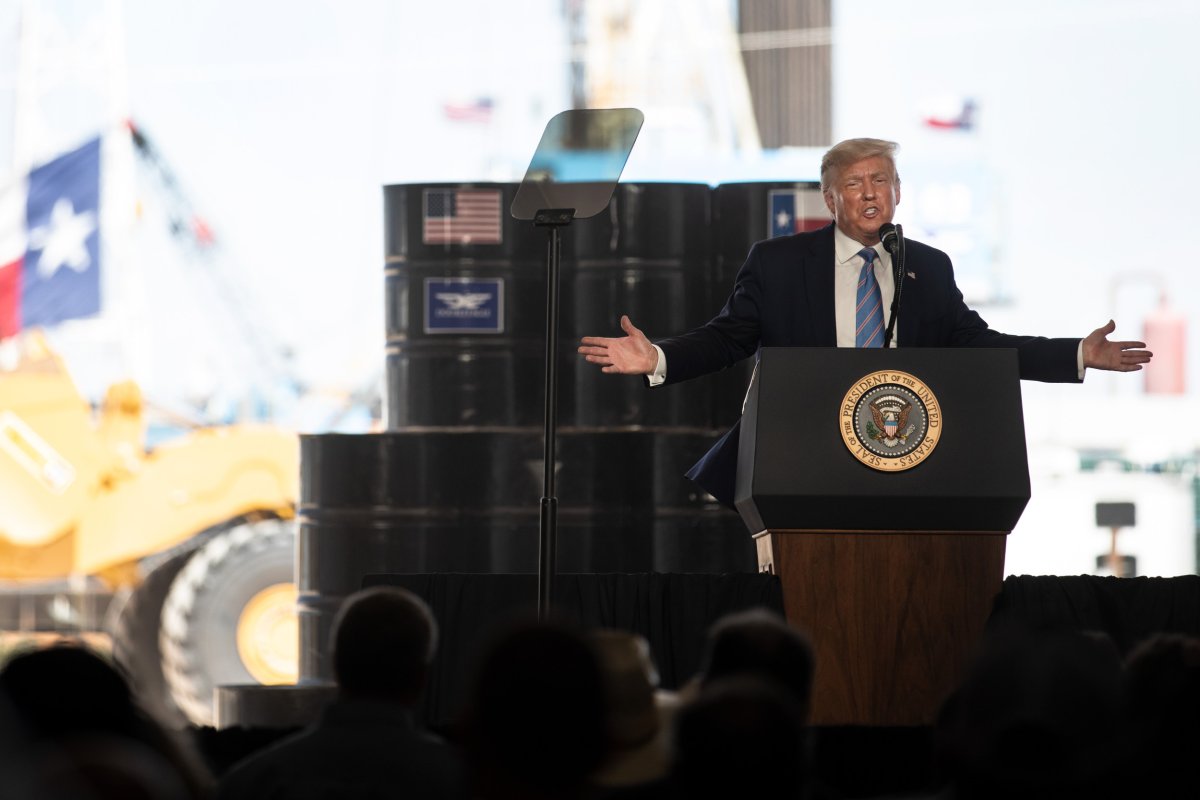American oil production has reached its largest volume in recorded history—more than 13.2 million barrels per day in October, official figures show—outpacing its highest point under Donald Trump’s presidency, 13 million barrels daily in November 2019.
This is despite President Joe Biden making environmental politics and the transition to a green economy a key plank of his agenda, while his predecessor has consistently touted a desire to increase fossil fuel production to keep the price of gas and energy low for consumers.
Environmentalists say that the levels of oil production seen at present in the U.S. are not necessary to facilitate the transition to renewable energy, and that it is within the president’s power to curtail it.
They warn that inaction could prove costly for Biden in the 2024 election among younger and climate-conscious voters whom he has sought to court.
Drew Angerer/Getty/Newsweek
“The message Biden is sending is that fighting the climate crisis is not a priority for him,” Jill Stein, the Green Party presidential candidate and likely nominee, told Newsweek. “Biden has betrayed climate voters, particularly young people, after they played a critical role in helping him get elected.”
However, one expert in environmental politics argued that keeping production high and prices low was a signal to the wider electorate that he was serious about tackling inflationary pressures, and that it is unclear what he plans to implement if reelected in November.
Newsweek reached out to the White House via email on Monday for comment.
While domestic oil production has soared to new heights under Biden, figures produced by the Bureau of Land Management suggest his administration has not significantly reduced the number of drilling permits on public lands, despite the president saying in February 2020: “No more drilling on federal lands, period.”
The number of permits approved for federal land fell from 9,173 in 2021 to 6,732 in 2022, but in the calendar year ending in October, the number crept up to 7,247 permits. Yet, analysis by the Washington Post in March suggested that the Biden administration had leased very little public land—which is needed prior to obtaining a license—compared to the previous two incumbents.
Jean Su, an environmental lawyer with the Center for Biological Diversity (CBD) in Washington, D.C., told Newsweek what was surprising and disappointing about the Biden administration was that “they have touted a very strong climate rhetoric, and his fossil fuel record completely undermines his clean energy record.”
Su cited a 2023 report by the organization which found that the new fossil fuel projects Biden had approved would outweigh the emissions reductions passed with the Inflation Reduction Act and his other climate policies by nearly a factor of two.
“There’s an inherent actual contradiction in what the Biden administration is doing in terms of its climate record,” Su said.
Rather than being hamstrung by a split Congress, the director of the CBD’s energy justice program argued that curbing domestic fossil fuel production is within the president’s powers.
What Su described as “the most obvious, commonsense action that he can take” is stopping the approval of new drilling permits on public land, which would mean projects would phase out over time or be limited to private leases.
Between 1975 and 2015, the U.S. had an export ban on crude oil, which while limiting international trade also meant that domestic oil prices were significantly lower than their international counterparts.
Baked into the legislation repealing the ban was a “safety valve that allows the president to declare an emergency and then reinstate that crude oil export ban…which will then have the effect of basically reducing and slowing down our oil production,” Su said, adding that’s what Biden would do “if he was very serious about curbing oil.”
Her comments were echoed by Stein, who said Biden “clearly has no inclination to limit oil production.”
But the president’s powers are not limitless, and concerns remain about what sort of global impact a U.S. export ban might have.
“Most of the oil and the gas that’s produced in the U.S. is on privately held land, and so there are questions, short term, [of] how much executive action could cover,” Barry Rabe, a professor of public policy and environment at the University of Michigan, told Newsweek.
Noting that Europe was reliant on American natural gas since the invasion of Ukraine on February 24, 2022, led to an abrupt severing of trade with Russia, Rabe suggested there would be “pretty significant” consequences to a ban that might not lead to a global reduction in fossil fuel emissions.
“There would probably be a global inflationary impact and you would have [an] incentive for other producers to ramp up production because the price would go up,” Rabe said.
Democrats have argued that while there is a need to transition to renewable energy, this is not a change that will happen overnight, so fossil fuels will still be needed to meet the nation’s energy needs in the interim.
Just before the controversial Willow Project was approved in Alaska—opening three new drilling sites on the North Slope—the state’s sole congresswoman, Mary Peltola, defended the project to Newsweek, saying that “we will need gap oil for at least the next decade” and that “importing our energy from abroad incurs even higher environmental costs than producing it here at home.”
Su said, though, that “we have enough oil production and enough open wells right now to support us for decades—and in terms of our climate and carbon budget, we can’t afford any more new drilling.”
“Increasing oil and gas production is not a necessary step in the transition to clean energy,” Stein said. “In fact, it’s the opposite of what’s needed, and makes it harder to meet the urgent need to phase out fossil fuels and replace them with clean renewable energy as soon as possible.”
Rabe added: “I think it’s fair to say that if the president now put a tight reduction on the production of oil and gas, prices would go up pretty dramatically, and whereas gas prices—at least where I am—are less than $3, you could envision that going up to three, four, maybe even five [dollars per gallon]. That might be the end of Biden’s reelection prospects.”
One possible rationale for the president’s inaction on oil production is inflation, which Biden has publicly tried to bring down after soaring during the COVID-19 pandemic, and which was felt by consumers mostly in supermarkets and at the gas pumps. Keeping supply above demand means prices remain relatively low.

Montinique Monroe/Getty Images
“I don’t think that there’s some great appetite in the United States to immediately cut off oil and gas production if that means either reducing supply and access, or increasing prices,” Rabe said. “And I think that creates a really tricky paradox because oil and gas prices are so low at the time we’re trying to make the case to people to aggressively move toward electric vehicles.”
Environmentalists argue that allowing new drilling sites does not keep prices low in the short term but has been sold to the electorate as a solution to inflation.
“It’s not going to combat inflation,” Su said. “When you open up Willow and other oil drilling projects, it takes years if [not] up to a decade to actually develop new oil reserves. So it’s a myth that opening up new production right now will affect people’s wallets in the near term.
“That is a myth that needs to be combatted, and that’s pretty much a Biden talking point on new oil production. They have made that narrative and I think they’re trying to manifest that into a political reality.”
Biden has remained largely silent on U.S. oil production. Neither has he publicly celebrated booming supply, nor has he explained to voters for whom climate is a key concern his reasoning for allowing it to rise.
“Voters who care about climate will be looking for a campaign for real climate action,” Stein said, touting her credentials as “a real choice for a liveable future.”
“There is a rising acknowledgement that any further production of new fossil fuels for the United States means game over for the planet, and young voters and anybody who’s tuned into the climate are increasingly disenchanted with this all-of-the-above energy approach which the Biden administration has completely embraced,” Su said.
“People are finally understanding—young voters, in particular, understand—that ending fossil fuels is actually the number one pillar of a realistic climate plan, and the Biden administration is completely undermining that,” she added, suggesting that the prospect of many young people deciding not to vote because of inaction on the climate is a serious threat for the Democratic Party in 2024.
But Biden’s attention may be on holding on to more mainstream voters, who often cast their ballot based on the economy.
“The underlying question is: Could Joe Biden be elected if gas is $5 a gallon?” Rabe said. “It does not seem he’s getting any political benefit from the Inflation Reduction Act, his poll numbers continue to drop to dangerous levels…and what would happen if in that short-term movement had a 50 percent increase in gasoline prices? Would voters flock to Biden? I don’t think so.”
Rabe suggested that Biden’s saying very little on oil production because he has said very little on many policy issues.
“This is fairly unusual territory,” he said. “He’s not doing lots of town hall meetings, he’s not going to New Hampshire, he’s not saying very much as a president seeking reelection.
“We’ve heard, I think, relatively little from the Biden administration about their priorities for a second term—climate change or otherwise. What would a second term look like?”
Uncommon Knowledge
Newsweek is committed to challenging conventional wisdom and finding connections in the search for common ground.
Newsweek is committed to challenging conventional wisdom and finding connections in the search for common ground.


